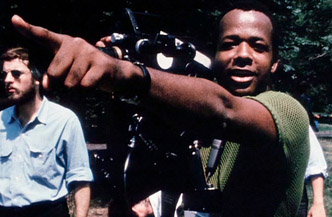Sole Criterion - Symbiopsychotaxiplasm: Two Takes
By Brett Ballard-Beach
October 25, 2012
DVD Spine #360
I saw Symbiopsychotaxiplasm: Take One for the first time on December 4, 2007 at the NW Film Center in Portland (Side note: don’t marvel at me, but rather the wonderful past program archives at nwfilm.org). I was drawn to it because… well, look at that title. It’s ridiculous. It sounds like a lost Grateful Dead album from the late late late 1960s (maybe even around the time Thomas Pynchon’s private eye novel Inherent Vice is set) or some body horror Cronenberg imitator from the late ‘70s/early ‘80s. Criterion released William Greaves’ documentary/fiction/experimental mashup and its 2003 counterpart Take 2 1/2 on DVD back in 2006. The 1968 film was nearing the 40th anniversary of its completion back when I viewed it, although this year marks the 20th anniversary of its screening at the Sundance Film Festival, at which point it was probably seen by more people in a theater than it had been in the prior 20 plus years.
I had failed, however, to pursue any kind of serious look into Greaves’ career, which is handled succinctly but insightfully by a documentary on the Criterion edition, and a great essay by film critic Amy Taubin. The first Symbiopsychotaxiplasm is a revelation in that it can rightly be considered a “lost” film that continues to unfold and be discovered to this day, while the career arc of its creator (still alive) is anything but undiscovered. The briefest synopsis is in order.
Born in 1926 in New York City, Greaves first achieved a fair measure of fame working on stage (with the American Negro Theater) and in low budget message pictures (i.e. dealing with the “race problem”) in the late 1940s and early 1950s. He joined the Actors Studio, the infamous theater group out of which the likes of Paul Newman and Marlon Brando were emerging at the time, but ultimately switched his career track to documentary filmmaking. With little to no opportunity here in the U.S at the time for African-American filmmakers of any genre, he moved to Canada and worked for 10 years with The Film Board taking his time and rotating through almost every position on a film crew. When he returned to the States in the early 1960s, the civil rights movement was taking center stage, and his talents as a documentarian were soon called into service. He has been producing award winning, acclaimed and challenging works for nearly 50 years.
Symbiopsychotaxiplasm: Take One came about - as many challenging works require - because there was an investor (a student in one of Greaves’ acting classes he was teaching) who offered to pay for the production of any film that Greaves might wish to make. Greaves had the general “idea” for the film (his production notes/thesis statements are also included in the Criterion edition) and what resulted is one of the more fascinating cinematic anomalies in American cinema. It’s an American New Wave picture with little precedent back then and because of its limited screenings in the 23 years after its release, no direct or overt influence on filmmakers of the era. It was ahead of its time back in 1968 and in curious ways foreshadows both the reality television boom and the found footage genre of the last decade.
I can imagine any number of scenarios in which this has value only as a curio, but Greaves is too skillful of a filmmaker for that to happen. He shot and shot - around 55 hours of footage it is estimated - and figured he would find the film in the editing room. This is an act of hubris and optimism and faith for any great filmmaker - from Kubrick to P.T. Anderson. He did find the film in the editing (also done by him) as well as the kind of conflict necessary to push forward any narrative, but neither in the way he might have imagined.
Continued:
1
2
3




